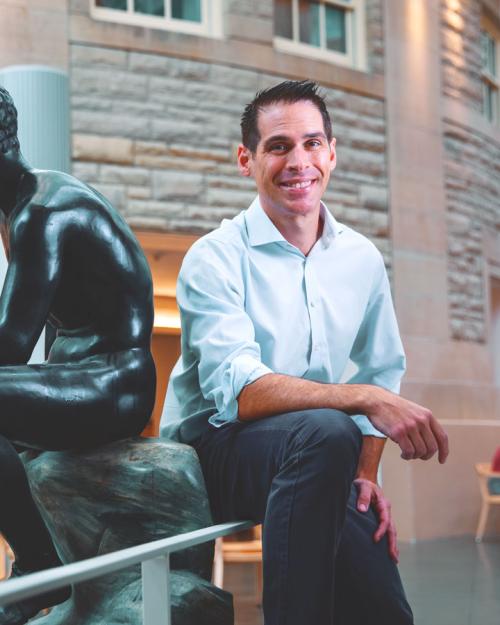Why is expertise that used to be authoritative now sometimes dismissed as “fake news”? Is it possible to save an endangered language by bringing a native speaker to Cornell to document it? And what does it mean to work in a Bosnian weapons factory when the source of one’s livelihood is lethal to others and the environment?
These are a few of the questions Cornell social sciences faculty are answering this spring, thanks to small grants from the Institute for the Social Sciences (ISS). The ISS’s Spring 2018 Small Grant Awards are designed to assist researchers as they develop new research and seek external funding.
With his grant, Kenneth Roberts, the Richard J. Schwartz Professor of Government, will organize a conference, “Authoritative and Contentious Knowledge: Democracy in the Era of ‘Fake News,’” to analyze how knowledge claims are constructed and contested in public opinion, the media and political campaigns.
In the Department of City and Regional Planning, assistant professor Nicholas Klein will be among the first to test the validity of the decades-old assumption that giving poor families cars can help them obtain jobs and move up the economic ladder.
Aija Leiponen, associate professor of applied economics and management, will research how people make privacy decisions about their digital personal data. Her project stems from a paradox that has confounded researchers in recent years: Individuals say they have strong preferences for privacy but their revealed preferences are actually weak.
Mats Rooth, professor of linguistics, and Pedro Rabelo Erber, associate professor of Luso-Brazilian studies, will bring to campus a native speaker of the endangered language of Bororo, the last living language of a family of languages known as "Bororoan." Only 1,290 people still speak it. With this native speaker, they will record a body of spoken Bororo, including transcripts, a phonetic dictionary, models for the language, and data and hypotheses about linguistic phenomena in Bororo. At the request of the Bororo community, they will also begin to create a book to teach the language to children in the community and an updated dictionary.
In a project titled “Work that Kills: The Social Life of a Bosnian Weapons Factory,” Saida Hodžić, associate professor of anthropology and of feminist, gender and sexuality studies, will examine how people in a Bosnian town reckon with the lethal legacies of Igman, a weapons factory that provides employment in a country with one of the world’s highest unemployment rates. She will explore the workers’ experiences with health hazards, their critique of ecological destruction and their views on the lethal purposes of ammunition production.
Other projects include:
- “Ecological Learning Collaboratory for Food, Healing, and Spatial Justice,” Neema Kudva, associate professor of city and regional planning; Rachel Bezner-Kerr, associate professor of development sociology; and Stacey Langwick, associate professor of anthropology;
- “‘Too-big-to-fail’ and Historical Banking Crises,” Matt Baron, assistant professor of finance;
- “Estimating Risk Preferences with Limited Consideration,” Levon Barseghyan, professor of economics; and Francesca Molinari, the H.T. Warshow and Robert Irving Warshow Professor of Economics;
- “Revolutionizing Assessment of Children’s Early Numerical Abilities with Portable EEG,” Daniel Cassanto, associate professor of human development;
- “Libertarian Noir: Unsettled Histories of Exit and Enclosure,” Raymond Craib, professor of history;
- “Water Conservation and Management: Agricultural Water Use, Climate Change and Government Policy,” C.-Y. Cynthia Lin Lawell, associate professor of applied economics and management;
- “A Critical Examination of After School Programming at Racially Diverse, Title I Middle Schools in Urban Communities,” Tashara M. Leak, the Lois and Mel Turkman Assistant Professor in the Division of Nutritional Sciences;
- “Gender, qualifications, and preferential hiring: Who gets hired, and under which conditions?” Neil Lewis Jr., assistant professor of communication;
- “Minority Hiring Quotas and Worker/Firm Match Quality: Evidence from Brazil,” Evan Riehl, assistant professor of economics;
- “Cross-cultural Public Opinion on Climate Change Amid Global Energy Transitions,” Jonathon Schuldt, assistant professor of communication;
- “Cascades and Fluctuations in an Economy with an Endogenous Production Network,” Mathieu Taschereau-Dumouchel, assistant professor of economics;
- “Status and the Politics of National Decline,” Steven Ward, assistant professor of government, and;
- “China’s Tree Crop Explosion: Impacts on Rural Development, Livelihoods, and Environmental Change,” John Zinda, assistant professor of development sociology.
This article also appeared in the Cornell Chronicle.




